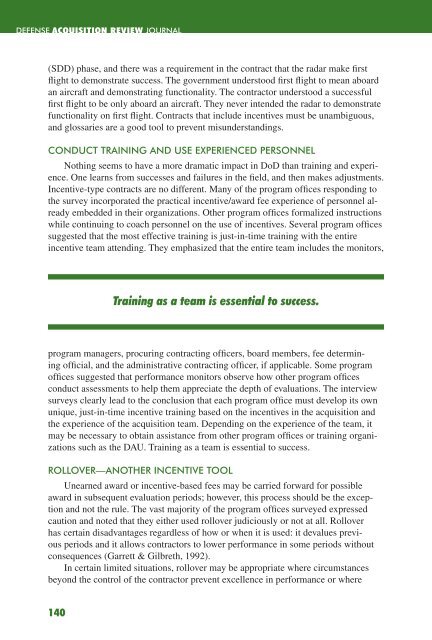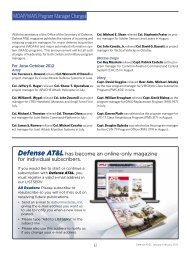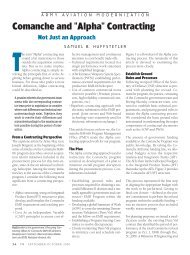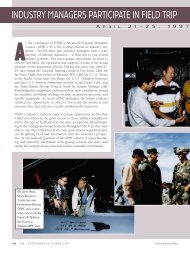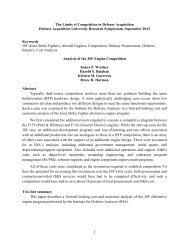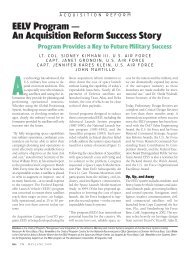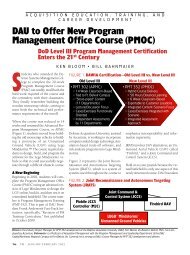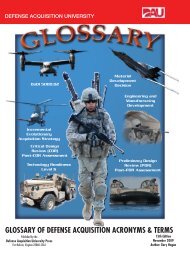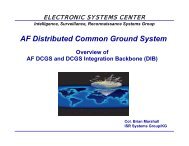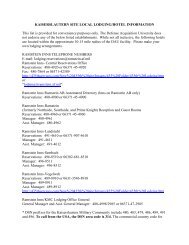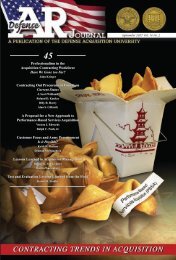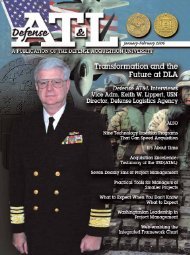Defense ARJ - Defense Acquisition University
Defense ARJ - Defense Acquisition University
Defense ARJ - Defense Acquisition University
You also want an ePaper? Increase the reach of your titles
YUMPU automatically turns print PDFs into web optimized ePapers that Google loves.
<strong>Defense</strong> <strong>Acquisition</strong> Review Journal<br />
(SDD) phase, and there was a requirement in the contract that the radar make first<br />
flight to demonstrate success. The government understood first flight to mean aboard<br />
an aircraft and demonstrating functionality. The contractor understood a successful<br />
first flight to be only aboard an aircraft. They never intended the radar to demonstrate<br />
functionality on first flight. Contracts that include incentives must be unambiguous,<br />
and glossaries are a good tool to prevent misunderstandings.<br />
conDuct traininG anD use exPerienceD Personnel<br />
Nothing seems to have a more dramatic impact in DoD than training and experience.<br />
One learns from successes and failures in the field, and then makes adjustments.<br />
Incentive-type contracts are no different. Many of the program offices responding to<br />
the survey incorporated the practical incentive/award fee experience of personnel already<br />
embedded in their organizations. Other program offices formalized instructions<br />
while continuing to coach personnel on the use of incentives. Several program offices<br />
suggested that the most effective training is just-in-time training with the entire<br />
incentive team attending. They emphasized that the entire team includes the monitors,<br />
program managers, procuring contracting officers, board members, fee determining<br />
official, and the administrative contracting officer, if applicable. Some program<br />
offices suggested that performance monitors observe how other program offices<br />
conduct assessments to help them appreciate the depth of evaluations. The interview<br />
surveys clearly lead to the conclusion that each program office must develop its own<br />
unique, just-in-time incentive training based on the incentives in the acquisition and<br />
the experience of the acquisition team. Depending on the experience of the team, it<br />
may be necessary to obtain assistance from other program offices or training organizations<br />
such as the DAU. Training as a team is essential to success.<br />
rolloVer—anotHer incentiVe tool<br />
Unearned award or incentive-based fees may be carried forward for possible<br />
award in subsequent evaluation periods; however, this process should be the exception<br />
and not the rule. The vast majority of the program offices surveyed expressed<br />
caution and noted that they either used rollover judiciously or not at all. Rollover<br />
has certain disadvantages regardless of how or when it is used: it devalues previous<br />
periods and it allows contractors to lower performance in some periods without<br />
consequences (Garrett & Gilbreth, 1992).<br />
In certain limited situations, rollover may be appropriate where circumstances<br />
beyond the control of the contractor prevent excellence in performance or where<br />
140<br />
Training as a team is essential to success.


